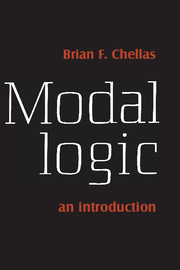10 - Conditional logic
Published online by Cambridge University Press: 05 June 2012
Summary
Conditionality affords a good example of a concept susceptible of analysis by means of the kinds of models and systems studied in this book. In section 10.1 we present the basic systems of conditional logic and the classes of models that determine them. In section 10.2 we return to the subject of deontic logic and define a minimal logic for conditional obligation. In section 10.3 we offer a definition of the conditional obligation operator in terms of simple obligation and non-deontic conditionality.
As with chapter 6, the purpose of this chapter is to illustrate the use of our semantic and deductive-theoretic techniques in the analysis of philosophically interesting concepts. Again, as in the earlier chapter, the reader will be the judge of the merit of the endeavor and the extent to which it is successful.
Conditionality
Into the language of propositional logic we introduce sentences of the form A => B. The operator => is meant to express a notion of conditionality – a notion in general distinct from that expressed by →.
In a standard conditional model ℳ = 〈W, f, P〉for the language of conditional logic/is a mapping that selects a proposition (set of worlds) f(α, X) for each world a and proposition, or condition, X.
Information
- Type
- Chapter
- Information
- Modal LogicAn Introduction, pp. 268 - 276Publisher: Cambridge University PressPrint publication year: 1980
Accessibility standard: Unknown
Why this information is here
This section outlines the accessibility features of this content - including support for screen readers, full keyboard navigation and high-contrast display options. This may not be relevant for you.Accessibility Information
- 1
- Cited by
